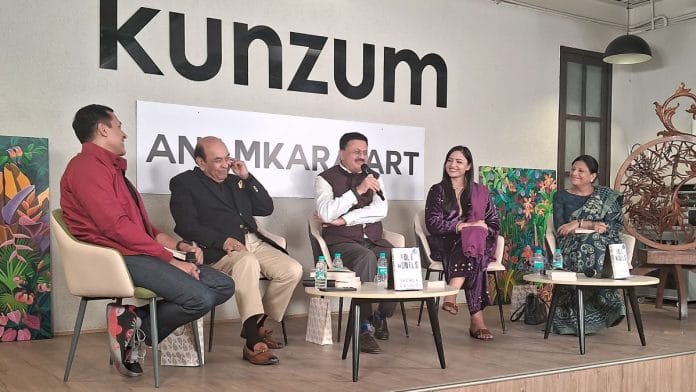New Delhi: An interaction with a group of students at a Ghaziabad madrasa a few years ago made Lt General Syed Hasnain (retd) realise how divorced some Muslims are from reality in India. “Are you a General? Which Army? Do Muslims serve in the Indian Army?” — Hasnain recounted these questions recently at the inauguration of former JNU Students’ Union vice president Shehla Rashid’s book Role Models: Inspiring Stories of Indian Muslim Achievers.
“In other words, he (the madrasa student) thought I was from the Pakistani Army,” said Lt General Hasnain.
The gathering at Delhi’s Kunzum bookstore on 24 November highlighted the complexities and nuances of the lived experiences of Indian Muslims. A panel discussion moderated by Anand Narasimhan, senior anchor at CNN-News 18, saw the guests lay out the systemic challenges faced by Muslims while simultaneously demonstrating how they also become role models by contributing to the fields of medicine, armed forces, sports etc.
Rashid described ‘Role Models’ as a self-help book consisting of a collection of autobiographical essays by achievers such as music composer AR Rahman, tennis star Sania Mirza, ISRO scientist Nigar Shaji, and paraplegic swimmer Shams Aalam, among others. The essays document their journeys from overcoming personal setbacks to eventually contributing to civil society across various fields.
The panellists included advocate Beenashaw Soni, Lt General Hasnain, doctor Jamal Khan, and Rashid. The gathering of around 40 people mostly included friends and acquaintances of the author, and some mediapersons.
Rashid said there is a certain “caricaturing of Muslims” in India, which “portrays Muslims as villains or victims, but there is none that portrays them as masters of their own destiny”.
“That is why I wrote this book.”
Systemic challenges
Lt General Hasnain asserted that misperceptions and misconceptions arise due to a “lack of awareness, lack of education” and also due to the absence of cross-community conversations in India. Those living in walled city areas under precarious situations share “a common culture, and common understanding. But no one goes out, and no one likes to go in, now that is the tragedy of India”.
Narasimhan read out an excerpt from the essay by Nigar Shaji, project director of ISRO’s Aditya L1 solar mission.
According to Shaji, “when we ask a girl child what she wants to be, she is likely to say something very ambitious”, but this changes during the course of socialisation. Things like “societal stigma, body shaming, discouragement from participating in sports” corrodes self-belief and confidence.
“While this might be true all over the world, it is a little more prevalent among our Muslim community”.
The panellists also discussed how class, as an economic category, affects people’s access to education.
“Madrasa education has gone up because in madrasa they are given food, shelter and education free of cost…so most of the Muslims who are very poor would like their children to be sent to a madrasa so that they shed off the responsibility of giving them shelter and food,” said Dr Jamal Khan.
Also read: Kamla Bhasin awardees are equality champions. Sri Lankan unionist to Bangladeshi footballer
The need for role models
As a Kashmiri woman, Rashid said she saw a void of narrative that positions Indian Muslims as “positive reference groups.”
Lt General Hasnain spoke about his “cosmopolitan” identity and a multi–faith existence which is so unique to India.
“I was sitting in class with a Hindu in front of me, a Sikh on my right, and probably a Christian on my left, and we all shared tiffin,” he said, adding, “how many people in the world have shared their tiffin at the table with so many different communities?”
“That makes us different.”
According to Dr Jamal, the way to sustain this peaceful coexistence would be through “building bridges among communities” and allowing members from different faiths to reside in the neighbourhood.
Shehla Rashid told ThePrint that the characters she interviewed for the book are “people who have come from hardships.” She cited Shams Aalam, an Indian para-swimmer and world record holder for the longest open-water swim by a paraplegic athlete, who, despite setbacks, didn’t give up.
“I didn’t have a choice, it was a… fight or die situation,” Aalam told Rashid during the interview for the book.
Shedding light on AR Rahman’s essay, Rashid quoted the music maestro as saying, “We should embody the change that we want to see in our country. We can complain that our country doesn’t have this or doesn’t have that, but assuming the responsibility of filling the perceived gaps will not only take the country forward but us as individuals too”.
The essays, the author said, were also about giving the message to Muslims that in India, “they can reach the top.”
(Edited by Aamaan Alam Khan)






